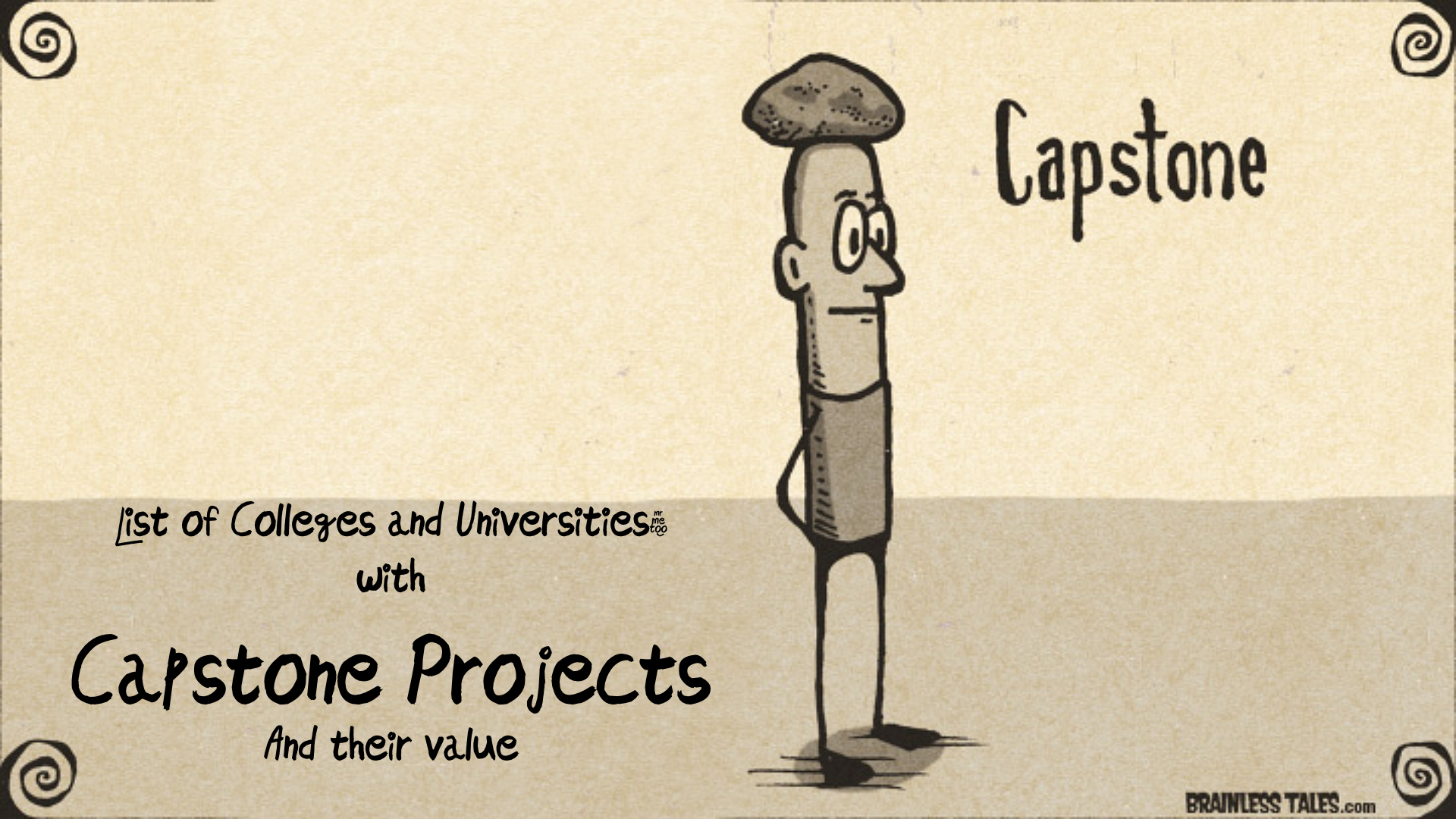
What is a capstone, or senior thesis, or senior seminar project? What makes it so valuable to students, and parents paying for college alike?
Outcomes, time, money, and, as technology advances, a better opportunity to stay employed.
CAPSTONE 101
Senior thesis projects are the most personal expression of the value of an education in higher ed below a masters, and, when done right, should be on a topic that a student can turn into a masters, and perhaps lead to a Ph.D., all of which open doors to better jobs and higher pay.
Students begin, in their junior year, thinking about, discussing with their faculty, then proposing a personal project of academic scholarship in their major.
They will then, over their senior year, write a comprehensive paper, or do a scientific research project, that is their own unique research, or a unique extension of research that they may be participating in with their faculty in college. They will then present that paper/project as part of the completion of their degree.
Many schools publish these projects and keep them as part of their library collections. Faculty keep them on PDF to work with students in placing them in graduate schools, post-graduate research opportunities and for other referrals.
Some schools require capstone/thesis projects for all majors. Others it is by major. At some schools it is an optional way of seeking a degree.
CAPSTONE ADVANTAGES
A capstone or thesis project is a better culmination of a student’s education, and the kind of preparation for attaining higher degrees, a masters, Ph.D., advanced M.D. or J.D. that:
- Distinguish yourself in an ocean of graduate applicants who simply graduated by having your own “signature” scholarly research that can make it easier for post-grad schools to determine their immediate value to ongoing research at the graduate level;
- Eliminate a costly year or more in grad school doing preliminary research work to prepare for a higher degree. Some work still needs to be done, but you have a big leg-up on the process compared to students at traditional programs/colleges;
- Increase earning power. Those who demonstrate that they have been applying themselves in constructive research in their field are desirable both by higher ed and by companies looking for people who solve particular problems, or have needed skillsets.
- In a 21st century where AI and robotics will replace a lot of lower level jobs that our overcrowded educational institutions used to serve, employment, and, potentially, survival are at stake. Labor-intensive jobs that volume educational institutions use to serve are the target of technological improvement. Many students are working towards degrees in fields at levels where they will not find a sustainable, long-term job in the future without demonstrating some level of academic excellence that an AI or algorithm can’t easily replace.
- Aid in graduate and employment placement: Professors at capstone schools help students “shop” both career tracks and placement at graduate schools. These are far better than professors’ letters of recommendation alone, because they showcase the work product of the student on its own merit. By contrast, most volume schools are employing social workers, or human resources people in “career guidance” centers to write recommendations and resumés based upon their transcripts. Which would you rather have in hand to go to the next level? Your own signature work product, or a document written by people who barely know you, one of thousands written annually by the institution?
5TH YEAR MASTERS TIE-IN
Schools like Case-Western Reserve University can extend the capstone into a 5th year masters for students who have done a lot of college work in high school, or those willing to spend one year to do two years worth of degree.
Do a larger project, and take seven overlapping courses in the undergrad/masters coursework, and, instead of a capstone, you have your Masters degree. That saves time, money, and strengthens your resumé further.
THE BETTER CALLING CARD TO HIGHER DEGREES, JOBS
Capstones become a “calling card” that distinguishes students seeking a graduate degree. Graduate schools do research, and scholarly work. A student out of a non-capstone school comes with either teacher recommendations, or, for larger state schools, a summary from the career guidance office.
Some projects are published as scholarly works and presented at seminars or symposia for the academic discipline.
So graduate professors are faced with two options: Professors known for producing top undergraduates who are sending them quality students armed with thoughtful capstone projects, or the lesser known-quantity of a student starting from scratch in year one of their graduate work.
Students graduating with a solid capstone that forms the basis of a good master’s thesis can shave off a year on a master’s degree, or do a “1/1” a one year master’s and a 1 year Ph.D. program.
Capstones also can become a basis for landing a job in a particular area of expertise.
STUDENTS TALK ABOUT THEIR CAPSTONE EXPERIENCES
“On Point” from WBUR (NPR) interviewed students who had completed the process in 2018.
Schools with Capstone/SENIOR THESIS Projects
Some schools offer capstone projects across the board and are a mandatory part of the education. Some schools’ departments do one, and others offer it as an option. Capstones integrated into a school’s degree program tend to be the ones more sought after by graduate programs. Other schools, which see the advantages, have been testing out capstone programs.
(This list is being updated. Please add any that we might have missed, and tell us which category!)
FULL CAPSTONE SCHOOLS
These are your top choices. Small or large, “nameplate” or sleeper school, you will get a superior education by going through this process, whether you go on to grad school or not.
- Alverno College
- Barnard College
- Bates College
- Bowdoin College
- Brandeis University
- Carleton College
- Carthage College
- Case-Western Reserve University
- Claremont-McKenna College
- College of Wooster
- Colorado College
- Elon University
- Embry Riddle Aeronautical University
- Emory University
- Fordham University
- Hamilton College
- Hampshire College
- Harvey Mudd College
- Haverford College
- Mount Holyoke College †
- New College of Florida
- Oberlin College
- Pomona College
- Princeton University
- Reed College
- Scripps College †
- Simmons College †
- Smith College †
- Swarthmore College
- Trinity College
- Union College
- Vassar College
- Wellesley College
- Williams College
CAPSTONE REQUIRED BY SELECTED MAJORS/ScHOOLS
Many traditional colleges are testing the water of the capstone experience. The politics of colleges/departments at any institution can be very hide-bound to their way of doing things, so you’ll find that, in these schools, capstones may indicate more progressive, forward-thinking departments.
- Agnes Scott College – Art History
- Amherst College
- Brown University – Honors or Teaching / Urban Policy
- Bryn Mawr College †
- Bucknell University
- Colby College
- College of the Holy Cross
- Farleigh Dickinson (Honors)
- Dickinson College
- Duke University
- Georgia Institute of Technology (Georgia Tech)
- Harvard University
- Johns Hopkins University
- Lafayette College
- Lehigh University
- Massachusetts Institute of Technology
- Northeastern University
- Rice University
- University of Rochester
- Skidmore College
- University of California — Berkeley
- University of Illinois — Chicago – Honors College
- University of Michigan–Ann Arbor
- University of Washington
- Villanova University
- Wesleyan University
- Yale University
CAPSTONE OPTIONAL/ENCOURAGED/NON-DeGREE
These schools offer capstones, in some, but not all departments, or majors. Some require you to find additional funding, amazingly, to do them. If you’re set on going to one of these schools, check the requirements and ask lots of questions about capstones, because you want one, if you can get it without added expense.
- Boston College
- Brown University
- Carnegie Mellon University
- Colgate University
- Connecticut College
- Franklin & Marshall College
- Lake Forest College
- Lewis & Clark College
- Middlebury College
- Notre Dame University
- Occidental College
- Pitzer College
- Princeton University
- Stanford University
- Tufts University
- University of Chicago
___________________
† – Women’s college

Pingback: Wesleyan University (CT) – TaDa!Education
Pingback: Why Me? & Other College Search Myths – TaDa!Education
Pingback: The Top 10 Reasons NOT to Choose A College – TaDa!Education
Pingback: Amazing Schools on the Roads Less Traveled – TaDa!Education